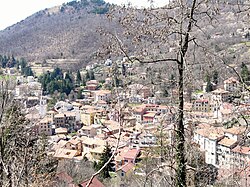Torriglia
| Torriglia | ||
|---|---|---|
| Comune | ||
| Comune di Torriglia | ||

Torriglia
|
||
|
||
| Location of Torriglia in Italy | ||
| Coordinates: 44°31′N 9°10′E / 44.517°N 9.167°ECoordinates: 44°31′N 9°10′E / 44.517°N 9.167°E | ||
| Country | Italy | |
| Region | Liguria | |
| Province / Metropolitan city | Genoa (GE) | |
| Frazioni | Bavastri, Casaleggio, Cavorsi, Donetta, Garaventa, Laccio, Marzano, Pentema | |
| Government | ||
| • Mayor | Maurizio Beltrami | |
| Area | ||
| • Total | 58.8 km2 (22.7 sq mi) | |
| Elevation | 769 m (2,523 ft) | |
| Population (31 July 2015) | ||
| • Total | 2,321 | |
| • Density | 39/km2 (100/sq mi) | |
| Demonym(s) | Torrigliesi | |
| Time zone | CET (UTC+1) | |
| • Summer (DST) | CEST (UTC+2) | |
| Postal code | 16029 | |
| Dialing code | 010 | |
| Patron saint | Nostra Signora della Divina Provvidenza | |
| Saint day | Last Sunday in August | |
| Website | Official website | |
Torriglia (Ligurian: Torriggia) is a comune (municipality) in the Metropolitan City of Genoa in the Italian region Liguria, located in the upper Trebbia valley, about 20 kilometres (12 mi) northeast of Genoa.
Torriglia borders the following municipalities: Davagna, Lorsica, Lumarzo, Mocònesi, Montebruno, Montoggio, Neirone, Propata, Rondanina, Valbrevenna.
The town was probably founded in Roman times. In the Middle Ages it was a possession of the Bobbio Abbey, and then (1227) of the Malaspina and (mid-14th century) of the Fieschi, who built a castle here. Later it was under the Republic of Genoa, and Torriglia was involved in the wars between Guelphs and Ghibellines, causing its siege by the Genoese in 1432. In 1548 it was acquired by the Doria family, who held it until the Napoleonic invasion of 1797.
In 1815 Torriglia became part of the Kingdom of Sardinia and, from 1861, of the unified Kingdom of Italy. During World War II it was the seat of partisan resistance.
Economy is mostly based on agriculture and cattle raising.
...
Wikipedia


